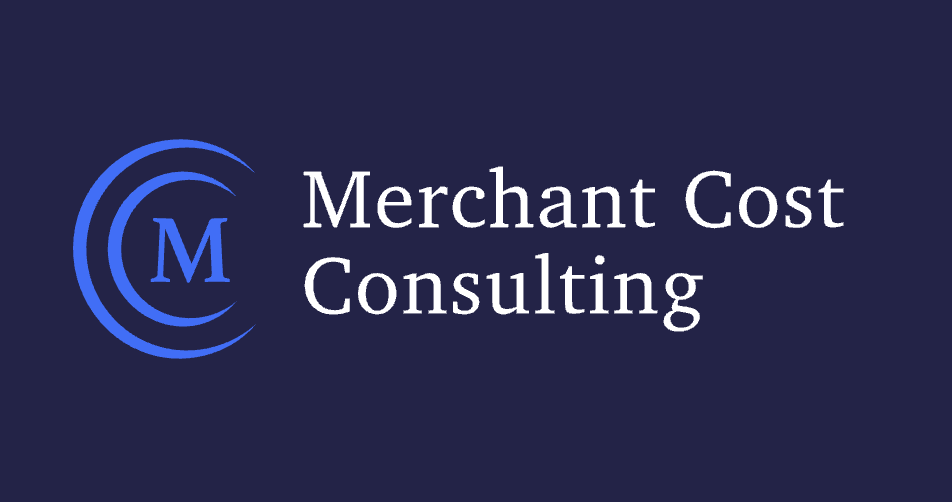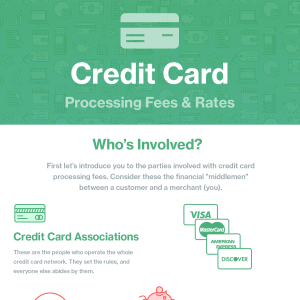PayPal processing fees have grown in complexity and are not easily understood by the average merchant. We'll explain exactly how much it costs to use PayPal and every potential fee you may encounter.
PayPal is a popular and convenient choice for merchants looking for all-in-one payment processing. However, PayPal processing fees are tough to summarize as they are dependent on a number of factors. We wrote this comprehensive look at PayPal’s merchant fees to help you understand the different rates and charges you may face when you use PayPal as your business online payment processor.
Read on to see what you can expect to pay if you use PayPal’s various business services.
Is There A Fee To Use PayPal?
A PayPal account is free to set up. When you start accepting payments, you’ll pay a percentage fee ranging from 1.9% to 3.5% and a fixed fee of 5 to 49 cents for each transaction. Additional paid services are available through your PayPal business account. You can buy these services either as a bundle or on an à la carte basis.
What Fees Does PayPal Charge?
If you’re an ordinary user with a standard account, PayPal charges very few fees.
- Selling: For US-based sellers using Standard credit/debit card acceptance, selling is 3.49% + $0.49 per sale when accepting PayPal digital payments and 2.99% + $0.49 per sale when accepting credit and debit card payments. However, these fees will be different if you’re using Advanced credit/debit card processing, if you’re accepting QR code payments, if you’re an eligible charity organization and/or are taking donations, if you’re selling internationally, or if other factors come into play. We’ll detail these differences in the PayPal Processing Fees & Monthly Charges Explained section below.
- Transferring Balance: Transferring money out of your PayPal account is typically free unless you need an expedited transfer, in which case you’re charged the Instant Transfer fee (see below).
- Sending: Sending funds to friends and family within the US is free unless you’re taking the money out from a debit card, a credit card, or your PayPal Credit account. If so, you’ll pay a per-transaction fee of 2.9% + $0.30. To send money internationally, you pay a 5% transaction fee with a minimum payment of $0.99 or a maximum of $4.99, regardless of where you’re taking the money out from.
PayPal Processing Fees & Monthly Charges Explained
Depending on the nature of your business and your future plans, you’ll want to understand PayPal’s fee structure in more detail. Below, we break PayPal’s fees down into some major categories.
PayPal Monthly Fees
While most of PayPal’s services are “free” because your per-transaction cost covers paying for the service, there are a few software services that have a monthly fee.
- For eCommerce, if you arrange for your own domain and web hosting, you can implement PayPal’s “buy” and “donate” buttons with no additional costs. You can send digital invoices for free and only pay the transaction cost when the invoice is paid. For physical stores, access to PayPal’s mPOS app, PayPal Zettle, is also free, though you’ll have to pay for a credit card reader/terminal and any other POS equipment you need.
- However, if you opt to integrate PayPal into a POS app, invoicing software, or another platform, you’ll be responsible for those software costs. PayPal doesn’t charge anything for the use of the integration.
If you want more advanced payment features, PayPal does offer them, but they come with additional costs.
PayPal Payments Advanced
With the Advanced plan, for $5/month, you can keep the checkout process on your website rather than redirect to PayPal to complete a transaction. You’ll have to use PayPal’s hosted checkout templates for submitting data for sales and authorizations. By using one of these templates, you avoid the PCI-compliance burden of having credit card details pass through your servers. Instead, PayPal handles PCI compliance.
PayPal Payments Pro
- The Pro plan, which costs $30/month, includes a virtual terminal to accept payments over the phone by keying in a card from a browser window. It also allows merchants to keep the checkout process on their website rather than redirecting to PayPal to complete a transaction.
- You won’t be using PayPal’s hosted checkout templates for this, so you won’t automatically be PCI compliant, and you’ll need to take additional steps to handle your PCI compliance. To this end, you can use the optional Transparent Redirect feature, so all payment details are posted silently to the PayPal server when the buyer presses submit instead of going through your server.
Virtual Terminal
If you don’t care about the other Payments Pro features, you can get the Virtual Terminal on a standalone basis for $30/month. That’s pretty pricey for a virtual terminal, considering you’ll still pay higher rates than swiped/dipped/tapped transactions. Square and Shopify both offer free virtual terminals.
Recurring Billing
If you want to sell subscriptions (software, gift boxes, etc.), PayPal offers a set of recurring billing tools. Recurring payments are available with PayPal Checkout and Standard credit/debit acceptance at no additional charge, but if you have Advanced credit/debit acceptance and want advanced tools, it will cost you $10/month. This doesn’t apply to “donate” buttons, which have their own option for donors to choose between a one-time or recurring donation.
Advanced Fraud Protection Services
This service costs $10/month + $0.05 per transaction, except the per-transaction fee is not applied with PayPal Checkout and Express Checkout transactions.
PayPal Transaction Fees
Here is a summary of PayPal transaction fees (for US transactions made in US dollars):
|
Rate |
Monthly Fee |
PayPal Digital Payments
(PayPal Checkout, Invoicing, Pay With Venmo, PayPal Credit, Etc.) |
3.49% + $0.49 |
None |
| Standard Credit/Debit Card Payments |
2.99% + $0.49 |
None |
| Advanced Credit/Debit Card Payments |
2.59% + $0.49 |
None |
| Advanced Credit/Debit Card Payments + Optional Interchange-Plus Pricing |
Interchange + 0.49% + $0.39 |
None |
| Payments Advanced |
2.89% + $0.49 |
$5/month |
| Payments Pro |
2.89% + $0.49 |
$30/month |
| Virtual Terminal |
3.09% + $0.49 |
$30/month |
| PayPal Zettle POS (Card-Present) |
2.29% + $0.09 |
None |
| PayPal Zettle POS (Manual Card Entry) |
3.49% + $0.09 |
None |
| QR Code Transactions ($10.01 & Above) |
1.9% + $0.10 |
None |
| QR Code Transactions ($10 & Below) |
2.4% + $0.05 |
None |
Regarding PayPal’s interchange-plus pricing: This pricing option is now available for sellers who have been approved for Advanced credit/debit card processing. If you’re a higher-volume seller, you may find that you save on processing costs with this pricing option — and if you don’t, you can just revert to flat-rate pricing from your dashboard and your pricing plan will change back at the start of the next month. I have to note, however, that PayPal’s published interchange-plus pricing rate is still higher than the interchange-plus rates offered by most of our preferred merchant account providers.
Now, let’s discuss some additional factors that will affect your PayPal fees for credit card processing.
Chargeback Protection
This is available to those who take Advanced credit/debit card payments. It exempts you from having to pay the $20 chargeback fee when a buyer rejects or reverses a card charge. It comes in two forms:
- Ordinary Chargeback Protection costs you an additional $0.40 per transaction and requires you to provide proof of shipment or proof of delivery for physical goods or services to retain the transaction amount and avoid paying the chargeback fee.
- Effortless Chargeback Protection costs $0.60 per transaction and does not require you to provide proof of shipment/delivery unless the chargeback involves transactions where the buyer did not receive the item.
PayPal Here
Merchants who sign up with PayPal for in-person payments are now onboarded to PayPal Zettle, rates for which are provided above. However, merchants who continue to use the PayPal Here mPOS app (PayPal’s legacy system for in-person payments) will continue to pay 2.7% per transaction (3.5% + $0.15 per keyed transaction), just as before.
Micropayments
PayPal offers its Micropayments plan to certain merchants with an average transaction size under $10 (I say “certain” because not all merchants will be accepted into the program, and PayPal doesn’t spell out how it determines who is eligible). These merchants will pay 4.99% + $0.09 for low-value transactions, with the lower fixed fee more than making up for the higher percentage fee.
Nonprofit Discount
PayPal also offers a nonprofit discount for online transactions to qualified 501(c)(3) nonprofits. The rate is 1.99% + $0.49 per transaction and applies to online transactions only. Our guide to using PayPal for nonprofits goes into further detail as to what PayPal can do for a nonprofit organization. PayPal is one of our highly recommended providers for credit card processing for nonprofits.
Donations (For Entities That Are Not Nonprofits)
You can accept donations even if you’re not a nonprofit organization. These transactions will process at a rate of 2.89% + $0.49 per transaction.
Third-Party POS Integrations
If you integrate with one of PayPal’s partner POS systems (such as Vend), you may be eligible for special discounts (presumably volume-based) or other promotions. If you’re interested in the possible discounts, ask about them when contacting the partner POS systems.
Other Common Merchant Account Fees
PayPal doesn’t charge merchants any PCI compliance fees, account maintenance fees, customer service fees, or termination/account closure fees.
Standard VS Advanced Credit & Debit Card Payments
If you saw our pricing table and wondered what these terms referred to, here’s a brief explanation.
- Standard Credit & Debit Card Payments: This refers to the default means of card acceptance available when you get a PayPal Business account. It gives you the standard payment options for your checkout page. Your buyers can pay with PayPal, credit/debit cards, Pay Later options, and Venmo. Seller protection (not Chargeback Protection) is included on eligible transactions.
- Advanced Credit & Debit Card Payments: These include the same payment options as Standard while also giving you the ability to customize your credit card fields. It’s also required if you want to add Chargeback Protection (more on that below), the Virtual Terminal, accept recurring payments and local/alternative payment methods, or if you want to upgrade your account to Payments Advanced (not the same thing as Advanced credit/debit payments) or Payments Pro. While Advanced credit/debit payments give you access to a lower card processing rate than Standard, you’ll have to apply for it (which involves providing additional info about your business) and be approved by PayPal. Also, only merchants using Advanced payments are eligible to opt into interchange-plus pricing.
PayPal Foreign Transaction & Currency Conversion Fees
Part of PayPal’s draw is that it has such a huge international reach. You can use this one platform to buy and sell to 96 countries and in 25 different types of currencies. Selling internationally, though, does involve paying some additional transaction fees.
- 1.5% Cross-Border Transaction Fee: For US merchants who accept online payments from buyers out of the country or in-person transactions involving a card from outside the US, PayPal charges a 1.5% cross-border fee on top of the percentage charge of the existing transaction fee. That means, for example, that a US merchant accepting a Canadian card at a POS terminal will pay 4.2% of the transaction value to PayPal. (Note that PayPal is one of our top recommended providers for Canadian merchant services.)
- 3-4% Currency Conversion Fee: If PayPal has to convert the currency before it deposits the funds in your account, you’ll pay another conversion fee of 3-4%, depending on the nature of the transaction. Whether you have to pay the conversion fee depends on the customer’s bank and whether it will handle the currency conversion (usually at a cost to the customer). One easy way to get around this is to require your customer to pay in your native currency.
Other PayPal Merchant Fees To Know About
Let’s examine the other PayPal fees you might come across.
$20 Chargeback Fee
Chargeback fees are pretty standard, although merchants generally want to prevent chargebacks from happening in the first place. If a customer files a chargeback against you, PayPal will assess a $20 fee in addition to withdrawing the funds to cover the transaction amount. The $20 fee is for transactions made in USD.
The amount is different if the transaction was made in another currency and will be waived if you have Chargeback Protection. Refer to PayPal’s merchant fee table for details.
Refund Fee
In the event of a refund, PayPal will not refund the transaction fee you originally paid to receive the payment. This means that refunds will essentially cost you 1.9-3.49% + $0.09-$0.49 of the amount you were paid, depending on the original transaction fee.
1.5% Instant Transfer Fee
If you’d like to move your PayPal balance to a bank account immediately, you can do that — for a fee. PayPal charges merchants 1.5% of the transfer value with a minimum fee of 50 cents, but your funds will be available typically within 30 minutes (so long as your bank’s system isn’t incredibly slow). You’ll have to connect an eligible debit card to support instant transfers as well. However, if you prefer to have instant access to funds without paying a fee, don’t forget that PayPal offers a business debit card that’s linked to your PayPal balance, too.
PayPal Payouts
PayPal Payouts is a useful feature for distributing funds to multiple parties. You have two choices here: using PayPal’s API to handle the command or uploading a spreadsheet. Some definite advantages come with using payment processing APIs because you can use them to create a custom payment processing setup.
Which method you choose affects how much you pay. If you upload a spreadsheet through PayPal’s website, you’ll pay 2% per transaction, capped at a maximum of $1. You’ll pay a flat fee of $0.25 per payment if you opt for the API. It’s a great way to distribute payments to contractors or manage marketplace payments if you use PayPal’s platform. Note these payments are in USD only, so if you want to pay in another currency or are located outside the US, check PayPal’s table to find the exact amount.
How To Calculate PayPal Merchant Fees For Small Business: 3 Case Studies
The amount you’ll pay in PayPal fees will depend on a variety of factors. Let’s conjure up two scenarios and see how much each theoretical merchant pays in Paypal fees.
Merchant 1: The Small Online Store Owner
Merchant 1 runs a modest online store called ToiletMemes.com. It sells humorous t-shirts, hats, and socks.
- The merchant uses PayPal Checkout to offer PayPal payment buttons as a supplementary payment method for customers who have PayPal accounts.
- The merchant uses no add-ons or paid features.
- Processing $800 in monthly PayPal transactions at the 3.49% + $0.49 rate with an average ticket of $14, the merchant is paying a little less than 98 cents per transaction.
- This comes out to about $55.92/month.
Merchant 2: The Sporting Goods Retailer
Merchant 2 sells sporting goods from both a brick-and-mortar retail location and online.
- The offline store makes use of two Standard Store Kits ($499 each).
- The online store uses PayPal Payments Pro ($30/month) to process payments and uses recurring billing ($10/month).
- The brick-and-mortar store processes $10,000/month at the 2.29% + $0.09 rate with an average ticket of $35.
- The eCommerce store processes $3,000/month at 2.89% + $0.49 with an average ticket of $28.
- A small portion of these transactions will be Virtual Terminal transactions and the like. They’ll process at a higher rate. Let’s just estimate that adds an extra $30/month in processing costs.
- When added together, all costs come to $464/month after an initial investment of $998 + tax for the Store Kits.
Merchant 3: The Café Owner
Merchant 3 runs a café in the city, selling mainly coffee and pastries. The café has no online component.
- The café takes payments via a Zettle Terminal with a printer and dock ($269).
- The cafe processes $15,000/month at the 2.29% + $0.09 rate with an average ticket of $10.
- Keyed-in transactions, processing at a higher rate, add an extra $20/month in processing costs.
- Costs come to $478.50/month after an initial investment of $269 + tax for the terminal, printer, and dock.
How Do PayPal Processing Fees Compare To The Alternatives?
All told, PayPal isn’t the cheapest processor around. This becomes ever more apparent with higher processing volumes. There are countless alternatives to PayPal out there in the payment processing industry, but let’s choose three leading providers for comparison: Square, Stripe, and Helcim.
PayPal vs. Square Pricing
Square is one of our favorite all-in-one processors. Given Square’s extensive and deep feature set, we actually recommend it over PayPal in many business circumstances, as you’ll see in our Square vs PayPal comparison. Cost-wise, Square’s online rate of 2.9% + $0.30 per transaction beats that of PayPal in most instances. Small-ticket sellers, in particular, will save on processing with Square due to its lower fixed per-transaction fee (30 cents vs. PayPal’s 49 cents).
Plus, Square, unlike PayPal, offers a virtual terminal or recurring billing for no monthly cost. For online sellers, Square offers remarkable value.
For in-person transactions, however, PayPal’s rate (2.29% + $0.09) beats that of Square (2.6% + $0.10). Businesses that are mostly or entirely in-person will save on processing with PayPal.
PayPal vs. Stripe Pricing
Stripe Payments specializes in online payment processing, and is a particularly strong choice for businesses needing a custom payments solution. In terms of cost, Stripe’s online rate (2.9% + $0.30 per transaction) is the same as that of Square, so the same pricing analysis described above applies here for online transactions: you’ll save on processing with Stripe in most instances, particularly if your average ticket size is small.
As for in-person payments, Stripe’s rate is 2.7% + $0.05 per transaction — a higher percentage than PayPal, but a lower fixed rate. The higher your ticket volume, the more you’ll save with PayPal. The lower your ticket volume, the more likely it is that any cost differences will be small enough to be inconsequential. However, Stripe’s POS capabilities are significantly less comprehensive than those of PayPal.
See our Stripe vs PayPal comparison piece for more.
PayPal vs. Helcim Pricing
Helcim, unlike PayPal, offers full merchant accounts, giving you greater account stability. Cost-wise, Helcim charges no monthly fee and offers interchange-plus pricing, which is our favorite pricing model for credit card processing fees. With interchange-plus pricing, unlike flat-rate pricing, it’s not easy to summarize exactly what you’ll pay on a per-transaction basis, but the end result is that you’ll most often pay less than you will with PayPal’s flat-rate pricing. Furthermore, Helcim’s published interchange-plus rates are lower than PayPal’s interchange-plus rates for Advanced checkout users.
Furthermore, Helcim offers volume discounts on processing to merchants selling more than $25K per month. In short, Helcim offers cheaper payment processing than PayPal, and this disparity will only grow as your sales volume grows. Of course, you’ll have to undergo a stricter underwriting process to be approved to use Helcim, and your account will come with fewer built-in services included. That said, you can fill these feature gaps with third-party integrations.
Are PayPal Processing Fees A Good Value For Small Businesses?
PayPal isn’t the cheapest processor out there — especially not for larger businesses that handle more than $10K/month in credit card transactions. These businesses may be eligible for merchant accounts with volume discounts.
For low-volume businesses, PayPal may offer more competitive pricing because of the lack of monthly fees and low in-person transaction fees, though the relatively high 49-cent fixed per transaction fee has turned off many small-ticket merchants.
However, the real value of PayPal is the massive consumer trust and convenience.
Plus, the barriers to entry are minimal — you don’t need much technical experience to implement PayPal for in-person or online payments. As long as you aren’t using PayPal Payments Advanced or Pro, you don’t even have to worry about PCI compliance (and with Advanced, you can get help). PayPal handles it for you, at no additional cost.
If you’re still on the fence about PayPal, our PayPal review contains a full feature rundown. And whether you’re looking for help creating a PayPal business account or you want to avoid the account terminations and holds that can occur with third-party processors like PayPal, Square, and Stripe, Merchant Maverick’s resources can help you every step of the way.












